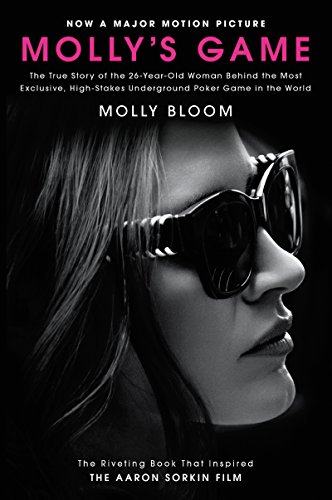Is Molly Bloom a Feminist Role Model?

Without mentioning religion or spirituality, the movie Molly’s Game dissects the American soul by revealing an underground world of gambling and male domination. It shows how our national ideal of material and financial success, with all the trimmings of status and power, can lead to unharnessed greed, self-destruction, and actualization of hell on earth. Men who are wealthy and famous are regular poker players for astronomical amounts of money. Their aim is domination and conquest, not increased wealth. The movie is an exposé of the demonic nature of success when devoid of spiritual or moral limitations.
The central character is Molly Bloom whose effort to qualify for the Olympic skiing team failed because of an accident that ended her career. The story is a fictionalized version of what happened when Molly decided to postpone law school, worked part-time jobs to support herself, and stumbled into an underground world where she excelled as a manager and behind-the-scenes manipulator. When charged in a federal racketeering case, she finds an attorney with a personality very like that of her father. Through the young daughter of her defense attorney, we are encouraged to see Molly as a role model and even hero; yet Molly’s own description of how she exploited human weakness dilutes any claim to heroism.
The movie is rich in dialogue that is fast and subtle so that at least three viewings are needed to appreciate the many layers of the narrative. The realities exposed by Molly’s experiences should be the focus of church and secular discussion groups. My college students need to talk about the movie because it illustrates what can happen if their desires for money and status are achieved. Women of all ages should talk about the demonic realities of unbridled male domination, especially when abetted by accommodating females enjoying indirect benefits of male power. Men should consider the insights into the father-daughter relationship presented in the movie, as well as the humbling realizations that should result from seeing the damage inflicted by dominant males who gain pleasure by destroying lives.
Near the end of the movie is a scene between father and daughter that almost competes with Jack Nicholson’s court appearance in A Few Good Men. Having only ten minutes on screen, Nicholson nearly stole the movie with electric and confrontational testimony. “You can’t handle the truth” has been repeated as often as memorable phrases from The Godfather. In this case, Kevin Costner played a therapist father who provided “three years of therapy in three minutes.” A long and probing discussion is needed to fathom the dimensions of the father-daughter connection that are exposed as well as her choice of an attorney whose personality mirrored her father.
The movie comes closest to making a religious reference when Arthur Miller’s The Crucible and the Salem witch trials are mentioned. Yet there is an unavoidable religious significance as materialism, greed, and abuse of power are on full display. Molly became a target of federal investigations, but most of the very worst characters in the movie escaped legal consequences and are still considered successful. The deeply spiritual challenge of the demonic values that often accompany financial success is hard to escape, even when religion itself seems completely irrelevant to all the participants in Molly’s story.
I have no idea whether the real Molly Bloom has found religious or spiritual meaning in her experiences. I would agree that the story as told in the movie presents someone worthy of imitation as she held on to personal integrity despite the many advantages of compromises she was offered. I believe that sort of outcome is more likely when we are guided by religious and spiritual principles.
Most sobering of all is how the movie dissects and opens to public view the inner despair, emptiness, and even insanity of the values guiding so many in our society and the devastating picture of what happens when people achieve nihilistic goals.
Postscript:
Consider these questions when watching the movie or for discussion groups after viewing the movie.
- The opening sequence before the title describes a series of personally challenging events with a distinctly arrogant attitude. How does this sequence set the tone of the movie? What kind of values or spiritual attitudes are exemplified by this tone?
- How do the recurring scenes with her father provide the underpinning for Molly’s story? Do they provide a foundation for success or failure? For integrity or submission?
- How does the relationship between Molly and her attorney reflect the relationship with her father?
- Does this movie demonstrate any positive male behavior? What values or spiritual orientation are seen in male behaviors?
- Do the behaviors by the various females in the movie demonstrate positive values? Are they typical female adjustments to dominant males? Are these behaviors forms of female domination?
About the Author
Dr. Edward G. Simmons was born in Savannah, Georgia, in 1943. A graduate of Mercer University, he earned both an M.A. and Ph.D. from Vanderbilt University. He is retired as an expert in the field of organizational management through thirty-four years of service for the Georgia Department of Human Resources. He returned to his original career by teaching history part-time at Georgia Gwinnett College and Brenau University. An energetic speaker and presenter of sermons and educational programs, he is the author of Talking Back to the Bible: A Historian’s Approach to Bible Study.
